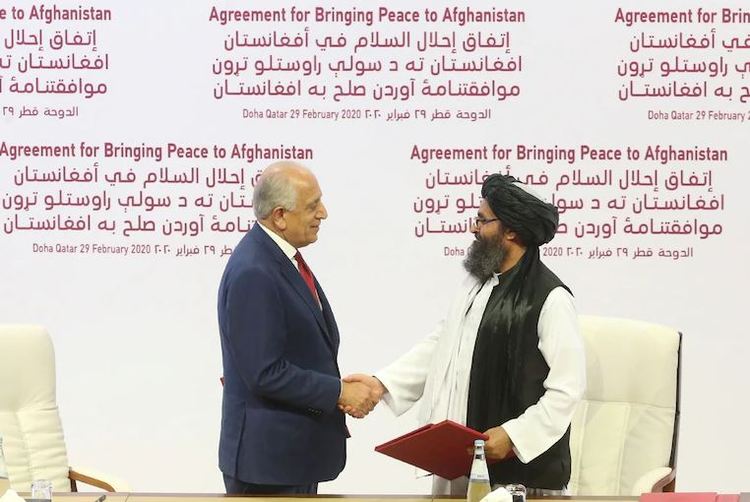Sa’adat Sharifi Pour in an interview with the site of Strategic Council on Foreign Relations referred to the authorization of the U.S. Department of Treasury for financial interaction with Taliban and Haqqani network and noted that:” Changing long term U.S. strategy in Afghanistan started during Obama presidency, and Trump Administration managed to follow up his so-called less expensive exit from the country.
He called the U.S. exit from Afghanistan as a trans-partisan issue and added:” the example to substantiate it is Biden Administration continued to cooperate with Zalmay Khalilzad to proceed the previous route on Afghanistan and the withdrawal took place. He was dismissed after the Afghanistan dossier reached to a relative stability.
The analyst on Sub-Continent and Afghanistan believes that:” the U.S. did not win the direct war in Afghanistan and it was obliged to withdraw. Now, the U.S. is making effort to use the cost of 20 year-long stay in the country in another way.
U.S. Effort to Control Crisis in Afghanistan
Sharifi Pour explained:” the U.S. has changed its strategy from a direct war and presence to an indirect presence and crisis management. Therefore, it does not want to let Taliban divert to China or Russia because of pressures. Prior to this, a large part of the U.S. and its allies’ indirect presence in Afghanistan was made through the Western NGOs, humanitarian aids and international agencies inside Afghanistan. In the new situation, this method of presence will be further strengthened.
He underscored:” as the U.S. loses a part of its operational capability due to its civil presence, it makes effort to reproduce and regain it in civil and political fields through political and international ways and means. The U.S. has taken steps in line with this and it will continue to do the same in future to reduce a little bit of pressure on Taliban”.
Having stated that after the U.S. withdrawal, all players lost to control the situation to some extent, the analyst on Sub-Continent mentioned the unpreparedness of Taliban for governance and said:” the lack of preparedness and the behavior of the region vis-à-vis them and the point that no player was ready to pay the price to recognize Taliban, caused the U.S. to use again its political and international instruments. Although, the U.N. announced that it refuses to recognize Taliban coincided with the announcement of the U.S. openings”.
U.S. Prevents Close Relations of Afghanistan with China, Russia and Neighbors
Sharifi Pour added:” The U.S. attempts to sell them more expensive whatever concessions given to Taliban at international arena as well as political and economic fields, and to give the concessions just to keep their government running and prevents Taliban to divert to China and Russia. In the meantime, solve their problems too and to feel less dependent on the U.S.”.
He continued:” the U.S. does not want Taliban government in Afghanistan to be a government that its neighbors can dominate it. Therefore, if the financial and humanitarian aids to Afghanistan will not perform in a way that Taliban government can remain in power, then Taliban will be obliged to incline towards its neighbors. The U.S. is not very interested in such a tendency and that’s why it makes efforts to exert controlled pressure over Taliban in a way that it could be manageable. Moreover, Taliban also tries to normalize its relations with the U.S.”.
U.S. Pressure on Afghanistan Neighbors
Having stated that Taliban has not managed to introduce itself as a logical group to its neighboring countries have concerns to recognize Taliban due to various reasons, the expert on Sub-Continent spelled out:” at present situation, the U.S. exploits these conditions and provides limited aids to Taliban, that may direct Afghanistan neighbors to raise this important question that the gap created between two neighbors in a situation when others have interactions with Taliban could lead to what secondary political, economic, border and or river consequences? In fact, the U.S. has made it more difficult for neighbors to decide”.
In the meantime, Sharifi Pour mentioned the present process and making effort to have a coordinated approach on the mechanism for recognizing Taliban among neighboring and regional countries as the most reasonable decision on recognition of Taliban and added:” Taliban have a large number of financial and economic weaknesses which have been extended to other sectors. They need to build foundation, and to establish police and army. They have to transform themselves from a subversive group of order to creators of new order and to set up government. We even witness that the group lacks a central mastermind to understand principles of border-keeping and interaction with neighbors”.
Having stated that a part of neighbors demands to Taliban, i.e. to create security and stability in Afghanistan refers to financial and economic capabilities, he said:” through granting the authorization, the U.S. has given Taliban an opportunity to use it and to prove itself to its neighbors and other countries if they are determined and resolute to rule over the country, and thus to step towards gaining legitimacy”.
Having emphasized that winter has always been problematic for all previous governments because of the lack of infra-structures in Afghanistan, the expert on Sub-Continent issues considered this as a factor to increase internal pressure on Taliban and added:” through granting some financial authorizations, the U.S. has also extended an assistance to Taliban to sort out this very challenge”.










0 Comments